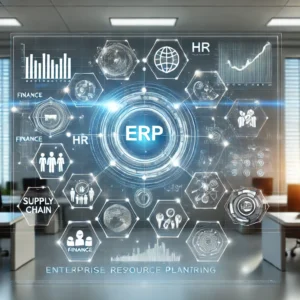What is ERP?
Definition and Purpose
Enterprise Resource Planning (ERP) is a suite of integrated software solutions designed to manage and automate core business processes across various departments, including finance, supply chain, human resources, and more. ERP systems serve as a unified platform, ensuring that every facet of an organization communicates seamlessly, thereby improving efficiency and reducing redundancy.
History and Evolution of ERP Systems
ERP traces its roots to the 1960s when Material Requirements Planning (MRP) systems were first introduced to assist manufacturing companies in managing inventory and production schedules. Over decades, ERP systems evolved, incorporating advanced features like customer relationship management (CRM) and analytics to cater to diverse industries beyond manufacturing.
Why is ERP Important for Businesses?
Role in Operational Efficiency
ERP systems are vital in optimizing day-to-day operations. By consolidating data and automating repetitive tasks, they minimize errors and ensure consistency across processes. This not only saves time but also enhances employee productivity, freeing teams to focus on strategic initiatives.
Impact on Business Growth
For growing businesses, scalability is key. ERP systems provide the flexibility needed to expand operations without overwhelming resources. With insights derived from centralized data, companies can make informed decisions that drive profitability and long-term success.
Core Features of ERP Systems
Centralized Data Management
Integration Across Departments
One of the standout features of ERP is its ability to connect various departments, ensuring that information flows seamlessly from one end of the organization to the other. This integration eliminates silos, enabling smoother collaboration.
Real-Time Data Access
ERP systems allow stakeholders to access up-to-date information at any time, which is crucial for responding to market demands and customer inquiries promptly.
Automation and Streamlining Processes
Reduced Manual Errors
Manual data entry is prone to errors that can lead to costly mistakes. ERP systems automate such processes, enhancing accuracy and reliability.
Enhanced Productivity
By automating repetitive tasks, employees can allocate their time and energy to activities that add more value, like strategy development and customer engagement.
Scalability and Flexibility
Adapting to Business Needs
ERP solutions can be customized to meet the specific needs of a business, whether it’s a small startup or a large enterprise.
Supporting Growth
As businesses grow, ERP systems can scale alongside them, ensuring that operations remain smooth and efficient regardless of size.
Types of ERP Systems
On-Premise ERP
Pros and Cons
On-premise ERP systems are installed locally on a company’s hardware. While they offer greater control over data, they require significant upfront investment and ongoing maintenance.
Cloud-Based ERP
Benefits of Accessibility
Cloud ERP solutions are hosted online, offering easy access from any location with internet connectivity. This is particularly beneficial for remote teams and global operations.
Cost Implications
While subscription-based pricing reduces initial costs, businesses must weigh long-term expenses against the convenience and scalability offered by cloud systems.
Hybrid ERP Solutions
Combining Cloud and On-Premise
Hybrid ERP combines the best of both worlds, offering the flexibility of cloud-based systems while maintaining critical operations on-premise for enhanced security.
Benefits of Implementing ERP
Enhanced Collaboration
ERP systems create a unified platform where data is centralized and easily accessible by all authorized team members. This promotes transparency and fosters collaboration across departments. For instance, sales teams can access inventory data in real time, allowing them to provide accurate delivery timelines to customers. Similarly, finance teams can pull accurate numbers from operations for budget planning, ensuring everyone is aligned.
When departments collaborate seamlessly, businesses can quickly adapt to market changes, address customer needs efficiently, and maintain a competitive edge.
Improved Decision-Making
Access to real-time data is one of the most significant benefits of ERP. Managers and executives rely on accurate and timely information to make decisions. With ERP, businesses gain insights into key performance metrics through detailed reports and dashboards, helping them identify trends, address bottlenecks, and plan strategically for the future.
For example, if inventory levels are depleting faster than anticipated, an ERP system can send alerts, allowing procurement teams to act swiftly, thus avoiding stockouts.
Regulatory Compliance
Staying compliant with regulations is a complex task, especially for industries like healthcare, finance, or manufacturing. ERP systems simplify this process by integrating compliance protocols into everyday workflows. Features such as audit trails, standardized reporting, and automated tax calculations ensure businesses adhere to local and international laws without hassle.
This proactive approach minimizes the risk of penalties while instilling confidence among stakeholders that the company operates responsibly.
Industries Leveraging ERP Systems
Manufacturing
Manufacturing firms were the earliest adopters of ERP, and for good reason. These systems help streamline production planning, inventory management, and supply chain logistics. By integrating procurement and production schedules, manufacturers can minimize downtime and optimize resource utilization.
For example, a car manufacturer can use ERP to synchronize component supply with assembly line schedules, ensuring timely production without excess inventory.
Healthcare
In the healthcare sector, ERP systems play a critical role in managing patient records, supply chains, and financial operations. They enhance the efficiency of hospital workflows, ensuring patients receive timely care. Additionally, they help healthcare providers comply with strict regulatory requirements like HIPAA by securing sensitive patient data.
Retail and E-commerce
Retailers and e-commerce businesses benefit from ERP systems to manage inventory, track customer orders, and forecast demand. By analyzing purchasing trends, these businesses can stock popular products and avoid overstocking items with low demand, improving profitability.
Moreover, ERP integrations with CRM tools enable personalized marketing, enhancing customer experience and loyalty.
Finance and Banking
In the finance sector, ERP systems streamline back-office operations, such as accounting, risk management, and regulatory reporting. Banks and financial institutions use ERP to gain a consolidated view of their operations, ensuring compliance with global standards and improving decision-making.
Conclusion
Enterprise Resource Planning (ERP) systems are indispensable tools for modern businesses aiming to optimize operations, enhance decision-making, and scale effectively. By providing centralized data, automating processes, and fostering collaboration, ERP empowers organizations to navigate challenges and seize opportunities. Whether you’re a manufacturing giant or a budding e-commerce store, adopting ERP can be the game-changer you need for sustainable growth.
FAQs
1. What is ERP in simple terms?
ERP stands for Enterprise Resource Planning. It’s a system that integrates various business processes like finance, HR, and supply chain into one platform, improving efficiency and decision-making.
2. How does ERP benefit small businesses?
ERP helps small businesses by automating manual tasks, improving data accuracy, and providing insights for better decision-making. It also supports scalability as the business grows.
3. What’s the difference between on-premise and cloud ERP?
On-premise ERP is installed locally on your company’s servers, while cloud ERP is hosted online and can be accessed from anywhere with internet connectivity.
4. How long does it take to implement an ERP system?
The implementation time varies depending on the system’s complexity and the size of the business but typically ranges from a few months to over a year.
5. Can ERP systems be customized?
Yes, ERP systems can often be tailored to meet the specific needs of a business, ensuring that it align with operational goals and industry requirements.


